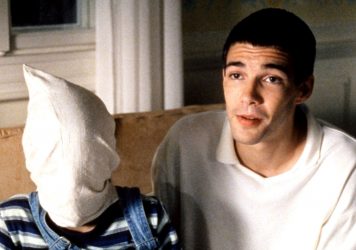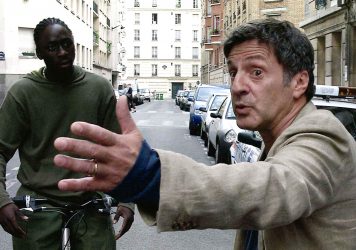Michael Haneke’s latest is an attack on everything you think you know about cinema. It’s a brutal beating.
Michael Haneke is an audience-hater, a bourgeois-baiter, a cinematic terrorist. He makes films that provoke and unsettle. He’s insistent, insidious. He’s subversive. He’s a creep. A shit. But he’s a genius.
His latest, Funny Games, might as well come with a flashing neon sign that bellows ‘Fuck You!’ at all who see it. From the minute that the tinkling tones of opera in the film’s opening credits are usurped by a hammering wail of heavy metal, he sets about systematically unmanning his audience, just as Anna, George and their son are abused by their tormentors. They, at least, will eventually be put out of their misery. We, on the other hand, will be left to stew.
Anybody with even a passing interest in Haneke’s films will know that Anna (Naomi Watts) and George (Tim Roth) are in trouble from the moment we see their spotless Range Rover, their big holiday house and their swanky lives. They’re exactly the kind of aspirational WASPs he skewered in Hidden, and here again they’re going to get a wake-up call they’ll never forget. It comes in the shape of ‘Peter’ and ‘Paul’ (Brady Corbet and Michael Pitt) two terrifyingly ordinary boys who are about to demonstrate a capacity for extraordinary cruelty.
In an era of endless property shows and a house price obsession, there’s a delicious frisson in watching the walls of somebody’s castle crumble around them, as George and Anna realise the full extent of what they’re in for. But what begins as exquisite torture quickly becomes something else altogether as Haneke reveals that he has no respect for the moral limits of human behaviour.
And – thrillingly, outrageously – no respect for the boundaries of cinema. One particular scene will have audiences shrieking in outrage. ‘It’s not fair,’ they’ll say. ‘You can’t do that!’ And indeed, you can’t. ‘But why?’ asks Haneke, coolly and calmly. ‘You say you’re tired of soulless blockbusters and genre formula, well watch me rip up the rulebook and start again.’ Always one step ahead of his audience, he dares us to be outraged because it justifies the brutality of his own actions.
The film’s nihilism is devastating. And more so for the fact that it’s a remake – an actual, shot-for-shot retread of a film Haneke has already made before in French. It adds another layer of galling, provocative pointlessness, of that sensational senselessness that bites and gnaws at us as an audience and challenges us either to find a reason (impossible!) or simply accept that there doesn’t need to be one. And that, right there, is the point.
In the film’s final scene, Peter tells Paul of his theory about the universe: fiction, he says, is as real as reality. False is true, black is white, and Haneke has produced a startling, recidivist attack on lazy passivity of cinema that’s as difficult to watch as it is to forget.
Published 4 Apr 2008
Can it really be an exact replica of an earlier film? Why would he do that?
Funny Games is an attack on everything you think you know about cinema. It’s a brutal beating.
It’s a remake but, paradoxically, a unique statement about the visceral power of cinema, and a dramatic challenge to convention.

Michael Haneke’s home invasion horror is a chilling satire of violence in popular entertainment.

By Kevin Maher
Daniel Auteuil and Juliette Binoche are terrorised by mysterious surveillance tapes in Michael Haneke’s gripping drama.

By Greg Evans
If you recognise this scene, you’ll already know what’s coming...